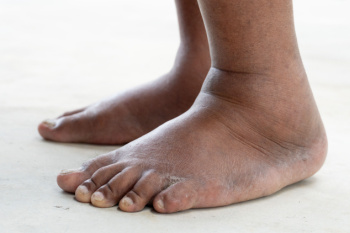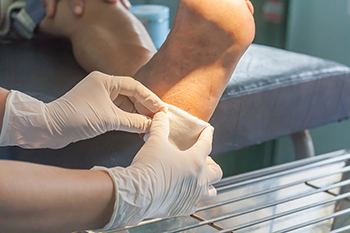Connect With Us
Blog

Sudden onset ankle pain without any apparent injury can be perplexing and concerning for many individuals. While it may seem mysterious, there are several potential causes behind this discomfort. One common reason can be overuse or strain, particularly from activities like running or jumping. Excessive stress on the ankle joint can lead to inflammation and pain. Additionally, conditions like both osteoarthritis and rheumatoid arthritis can flare up suddenly, causing discomfort in the ankle joint. In some cases, sudden ankle pain may be linked to an underlying medical condition, such as gout or tendonitis. Improper footwear or sudden changes in physical activity levels can also contribute to ankle pain. It is essential to pay attention to any accompanying symptoms and seek medical evaluation from a podiatrist to determine the root cause of the pain. If you have sudden ankle pain, it is suggested that you contact this type of doctor who can offer you relief and treatment options.
Ankle pain can be caused by a number of problems and may be potentially serious. If you have ankle pain, consult with Dr. Yeon A. Shim from Roselle Podiatry Group. Our doctor will assess your condition and provide you with quality foot and ankle treatment.
Ankle pain is any condition that causes pain in the ankle. Due to the fact that the ankle consists of tendons, muscles, bones, and ligaments, ankle pain can come from a number of different conditions.
Causes
The most common causes of ankle pain include:
- Types of arthritis (rheumatoid, osteoarthritis, and gout)
- Ankle sprains
- Broken ankles
- Achilles tendinitis
- Achilles tendon rupture
- Stress fractures
- Bursitis
- Tarsal tunnel syndrome
- Plantar fasciitis
Symptoms
Symptoms of ankle injury vary based upon the condition. Pain may include general pain and discomfort, swelling, aching, redness, bruising, burning or stabbing sensations, and/or loss of sensation.
Diagnosis
Due to the wide variety of potential causes of ankle pain, podiatrists will utilize a number of different methods to properly diagnose ankle pain. This can include asking for personal and family medical histories and of any recent injuries. Further diagnosis may include sensation tests, a physical examination, and potentially x-rays or other imaging tests.
Treatment
Just as the range of causes varies widely, so do treatments. Some more common treatments are rest, ice packs, keeping pressure off the foot, orthotics and braces, medication for inflammation and pain, and surgery.
If you have any questions, please feel free to contact our office located in Roselle, NJ . We offer the newest diagnostic and treatment technologies for all your foot care needs.
 Swelling in the feet, otherwise known as edema, has a range of mild to severe causes. Mild edema may result from standing or sitting for long periods, especially in hot weather. This causes fluid to pool in the lower extremities. Swelling can also be a side effect of certain medications, hormonal changes, or dietary factors like excessive salt intake. In more severe cases, edema may be a sign of underlying medical conditions, such as heart failure, kidney disease, or venous insufficiency. In these cases, the body’s fluid balance is off, leading to fluid retention and swelling in the feet and ankles. Certain injuries, infections, or blood clots in the legs can also cause localized edema. Podiatrists, or foot doctors, can diagnose the underlying cause of foot swelling. They may recommend lifestyle modifications, compression therapy, medication management, or other treatments to address the cause. If you have swelling in the feet or ankles, it is suggested that you make an appointment with a podiatrist to find relief.
Swelling in the feet, otherwise known as edema, has a range of mild to severe causes. Mild edema may result from standing or sitting for long periods, especially in hot weather. This causes fluid to pool in the lower extremities. Swelling can also be a side effect of certain medications, hormonal changes, or dietary factors like excessive salt intake. In more severe cases, edema may be a sign of underlying medical conditions, such as heart failure, kidney disease, or venous insufficiency. In these cases, the body’s fluid balance is off, leading to fluid retention and swelling in the feet and ankles. Certain injuries, infections, or blood clots in the legs can also cause localized edema. Podiatrists, or foot doctors, can diagnose the underlying cause of foot swelling. They may recommend lifestyle modifications, compression therapy, medication management, or other treatments to address the cause. If you have swelling in the feet or ankles, it is suggested that you make an appointment with a podiatrist to find relief.
Swollen feet can be a sign of an underlying condition. If you have any concerns, contact Dr. Yeon A. Shim of Roselle Podiatry Group. Our doctor can provide the care you need to keep you pain-free and on your feet.
Swollen feet are a common ailment among pregnant women and people who stand or sit for extended periods. Aging may increase the possibility of swollen feet and patients who are obese often notice when their feet are swelling too. There may be medical reasons why swollen feet occur:
- Phlebitis - A condition that causes the veins to become inflamed and can also cause leg pain.
- Liver disease - This may lead to low blood levels of albumin which is a protein. This can cause fluid in the blood to pass into the tissues and several areas of the body can become swollen.
- Heart failure - When the heart doesn’t pump properly the blood that is normally pumped back to the heart can pool in the veins of the legs causing swollen feet.
- Kidney disease - One of the main functions of the kidneys is releasing excess fluid in the body. This type of condition can make it difficult for the kidneys to function properly, and as a result the feet may become swollen.
- Deep-vein thrombosis (DVT)- This is a serious condition where blood clots form in the veins of the legs. They can block the return of blood from the legs to the heart which may cause the feet to swell. It is important to be treated by a podiatrist if this condition is present.
Swollen feet can also be caused by bone and tendon conditions, including fractures, arthritis, and tendinitis. Additionally, there may be skin and toenail conditions and an infection may cause the feet to swell. Patients who take medicine to treat high blood pressure may be prone to getting swollen feet.
Many patients elevate their feet to help relieve the swelling and this is generally a temporary remedy. When a podiatrist is consulted the reason behind the swelling can be uncovered and subsequently treated.
If you have any questions please feel free to contact our office located in Roselle, NJ . We offer the newest diagnostic tools and technology to treat your foot and ankle needs.

Charcot foot, also known as Charcot neuroarthropathy, is a condition characterized by progressive weakening and degeneration of the bones and joints in the foot or ankle. It often affects individuals with peripheral neuropathy, such as those with diabetes. One significant complication of Charcot foot is the development of foot ulcers, which can result from pressure points and trauma due to the structural changes in the foot. These ulcers are particularly problematic as they can lead to serious infections and even amputation if left untreated. Unfortunately, Charcot foot and its associated ulcers may go undiagnosed or misdiagnosed initially due to symptoms resembling other foot conditions or neuropathic pain masking typical signs of inflammation. Podiatrists provide comprehensive care for Charcot foot including diagnosis, wound care, orthotic interventions, and patient education to prevent complications and improve the quality of life for affected individuals. If you feel a weakening in your feet or ankles, it is strongly suggested that you schedule an appointment with a podiatrist for a proper diagnosis and treatment. If you have Charcot foot, early intervention can thwart severe problems.
Wound care is an important part in dealing with diabetes. If you have diabetes and a foot wound or would like more information about wound care for diabetics, consult with Dr. Yeon A. Shim from Roselle Podiatry Group. Our doctor will assess your condition and provide you with quality foot and ankle treatment.
What Is Wound Care?
Wound care is the practice of taking proper care of a wound. This can range from the smallest to the largest of wounds. While everyone can benefit from proper wound care, it is much more important for diabetics. Diabetics often suffer from poor blood circulation which causes wounds to heal much slower than they would in a non-diabetic.
What Is the Importance of Wound Care?
While it may not seem apparent with small ulcers on the foot, for diabetics, any size ulcer can become infected. Diabetics often also suffer from neuropathy, or nerve loss. This means they might not even feel when they have an ulcer on their foot. If the wound becomes severely infected, amputation may be necessary. Therefore, it is of the upmost importance to properly care for any and all foot wounds.
How to Care for Wounds
The best way to care for foot wounds is to prevent them. For diabetics, this means daily inspections of the feet for any signs of abnormalities or ulcers. It is also recommended to see a podiatrist several times a year for a foot inspection. If you do have an ulcer, run the wound under water to clear dirt from the wound; then apply antibiotic ointment to the wound and cover with a bandage. Bandages should be changed daily and keeping pressure off the wound is smart. It is advised to see a podiatrist, who can keep an eye on it.
If you have any questions, please feel free to contact our office located in Roselle, NJ . We offer the newest diagnostic and treatment technologies for all your foot care needs.

